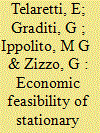|
|
|
Sort Order |
|
|
|
Items / Page
|
|
|
|
|
|
|
| Srl | Item |
| 1 |
ID:
150633


|
|
|
|
|
| Summary/Abstract |
Battery energy storage systems (BESSs) are expected to become a fundamental element of the electricity infrastructure, thanks to their ability to decouple generation and demand over time. BESSs can also be used to store electricity during low-price hours, when the demand is low, and to meet the demand during peak hours, thus leading to savings for the consumer. This work focuses on the economic viability of BESS from the point of view of the electricity customer. The analysis refers to a lithium-ion (Li-ion), an advanced lead-acid, a zinc-based, a sodium-sulphur (NaS) and a flow battery. The total investment and replacement costs are estimated in order to calculate the cumulated cash flow, the net present value (NPV) and the internal rate of return (IRR) of the investment. A parametric analysis is further carried out under two different assumptions: a) varying the difference between high and low electricity prices, b) varying the peak demand charges. The analysis reveals that some electrochemical technologies are more suitable than others for electric bill management applications, and that a profit for the customer can be reached only with a significant difference between high and low electricity prices or when high peak demand charges are applied.
|
|
|
|
|
|
|
|
|
|
|
|
|
|
|
|
| 2 |
ID:
111405


|
|
|
|
|
| Publication |
2012.
|
| Summary/Abstract |
Renewable energy sources (RES) based stand-alone systems employing either wind or solar power and energy storage comprise a reliable energy alternative, on top of conventional diesel-electric generator sets, commonly used by remote consumers. However, such systems usually imply the need for oversizing and considerable energy storage requirements leading to relatively high costs. On the other hand, hybrid configurations that may exploit both wind and solar potential of a given area may considerably reduce energy storage capacity and improve the economic performance of the system. In this context, an integrated techno-economic methodology for the evaluation of hybrid wind-photovoltaic stand-alone power systems is currently developed, aiming at the designation of optimum configurations for a typical remote consumer, using economic performance criteria. For the problem investigation, the developed evaluation model is applied to four representative areas of the Greek territory with different wind potential characteristics in order to obtain optimum configurations on the basis of minimum initial investment, 10-year and 20-year total cost. According to the results obtained, the proposed solution is favorably compared with all other stand-alone energy alternatives, reflecting the ability of hybrid systems to adjust even in areas where the local RES potential is not necessarily of high quality.
|
|
|
|
|
|
|
|
|
|
|
|
|
|
|
|
|
|
|
|
|